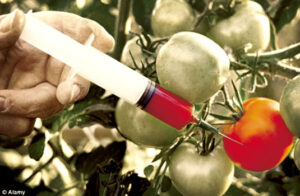
Genetic modification or engineering is the manipulation of genes within organisms or between un-related species, producing foreign organisms that have not previously existed.
It is a risk-laden technology, presenting unpredictable consequences, as the behaviours and adaptability of new, foreign species is not known.
While there is debate and arguments, both from those supporting genetically modified organisms (GMOs) and those opposed, organic agriculture, based on the precautionary principle, prohibits genetic modification in organic farming, production and processing systems.
Some of the concerns are listed below.
- Released GMOs cannot be recalled or controlled – the growth of these organisms could lead to over-exploitation and contamination of fields of non-genetically modified crops.
- Short terms negative environmental impacts – including:
- the disruption of the food web in the ecosystem, affecting pollinating species such as bees and butterflies;
- acquired pest resistance to (Bt) toxin from genetically modified crops; and
- disturbance of the food web in the soil.
- Loss of biodiversity – the use of GMOs reinforces genetic homogeneity and promotes large-scale monocultures, contributing to a decline in biodiversity and increased vulnerability of crops to climate change, pests and diseases.
- Pollution of the gene-pool of cultivated crops, micro-organisms and animals – nature’s living organisms could be less competitive and less dominant over GMOs, causing them to become endangered.
- Violation of farmers’ fundamental property rights and endangerment of their socio-economic independence – where genetically modified crops have been planted, farmers are locked into buying inputs and costly seed and can no longer save seeds.
- Risk to human health – while discussion continues over the possible long-term effects of genetic modification on human health, some studies are emerging that demonstrate there are risks associated with it or, at the very least, great unknowns:
- toxins from genetic engineering introduced in seed crop genes have been detected in human blood by scientists;[1]
- scientific laboratory animals exclusively fed with genetically modified food have developed cancers;[2]
- higher rates of stomach and digestive inflammation have been studied in livestock fed with genetically modified food;[3] and
- we humans have a complex digestive system populated with flora, fauna and enzymes that have evolved over millennia to recognise and break down foods found in nature to make nutrients available to feed our body. However, genetically modified crops and foods contain unknown genetic properties that are new to the human diet and may not be recognised by the intestinal systems as digestible food.[4]
The genetic modification industry attempts to intervene in nature by creating artificial living organisms in order to solve a particular pest or production issue but, without consideration of the whole ecosystem, these interventions could inadvertently trigger other problems.
[1] Reproductive Technology 2011, http://www.ncbi.nlm.nih.gov/pubmed/21338670
[2] Archives of Environmental Contamination and Toxicology, http://www.ncbi.nlm.nih.gov/pubmed/17356802
[3] Journal of Organic Systems, 8(1), 2013. A long-term toxicology study on pigs fed a combined genetically modified (GM) soy and GM maize diet.
[4] http://www.sciencedaily.com/releases/2011/09/110919074242.htm
